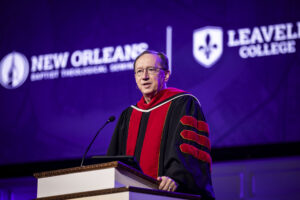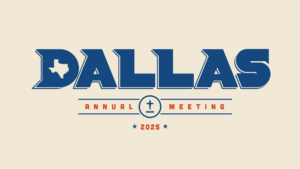
LOUISVILLE, Ky. (BP)–The great Southern Baptist preacher R.G. Lee, often remembered for his classic sermon “Payday Someday,” defined his commitment to the Baptist denomination as follows: “I was Baptist born, I was Baptist bred, and when I die, I’ll be Baptist dead.”
Lee, while clearly asserting the need for new birth throughout his long ministry, also regularly stated what being a Baptist means: a commitment to the authority of an inspired and inerrant Bible and the doctrines it conveys.
Can Baptists today give a clear and cogent biblical reason for their name and heritage, or has theological minimalism so seeped into churches that defining “Baptistness” has become an impossibility and even a non-necessity?
Tom J. Nettles and Russell D. Moore, faculty members at Southern Baptist Theological Seminary, aim at a comprehensive definition of Baptist life with a new book, “Why I Am A Baptist.” It is published by Broadman & Holman, the trade publishing division of LifeWay Christian Resources of the Southern Baptist Convention.
The book contains 26 essays written by Baptist theologians, pastors and laypersons and historical figures that bear witness to the rich theological and biblical heritage of Baptist life.
Nettles is professor of historical theology; Moore teaches Christian theology and will join the theology faculty this fall. Both see as critical the need for Southern Baptists to recover a clear understanding of the heritage and doctrines upon which Baptist commitment was built.
Being Baptist, Nettles said, is infinitely more than modern notions of individual autonomy and liberty that seem to accompany contemporary discussions of Baptist identity; traditionally, Baptists have embraced clearly held theological convictions.
“We did this book because we wanted our readers to know that the Bible still convinces people to be Baptist,” Nettles said. “Issues of freedom disconnected from biblical authority sometimes dominate discussions of what it means to be a Baptist; that is not the original Baptist witness.
“Freedom is a byproduct of Baptist ecclesiology and Baptist concepts of confessions. Biblical authority and theology drove Baptists from the first, and testimonies in this book show that these issues still matter to many Baptists.”
The title itself has a storied history. “Why I Am A Baptist” has been used with various books and essays written throughout Baptist history by writers as diverse as conservative state newspaper editor Joe Odle and liberal social gospel proponent Walter Rauschenbusch.
Odle, who edited the Baptist Record in Mississippi, was a particular influence for this book, Moore said. Both Nettles and Moore are natives of Mississippi.
“Odle understood that being Baptist was a claim to biblical truth, not a club into which one is born,” Moore said. “If we do not recover a sense of Baptist identity, there will not be a Southern Baptist Convention to greet the 22nd century. My grandfather was a nominal Methodist in northern Mississippi, while my grandmother was a nominal Presbyterian. When the Lord saved them through the gospel, my grandmother tells me, they spent nights on the floor with copies of confessions of faith from neighborhood churches, comparing each to the New Testament.
“After days of agonizing and praying, they were Baptists. They were then immersed in an icy pond in the middle of winter, despite my great-grandmother’s pleading that my grandmother would catch a chill and leave my father an orphan. But they were convinced that there was no other option in light of the truth of Scripture. You do not hear many testimonies like that anymore.”
Moore believes there is a desperate need for Baptists to recover a conscious biblical understanding of the distinctives of their faith and practice. He names a personal instance in which he was confronted by a young woman who had been “baptized” by having water sprinkled over her head. When Moore asked a group of Baptists whom he was teaching to advise the woman as to the validity of this so-call baptism, only silence greeted the query, he said.
“Despite their rhetoric about being the ‘authentic Baptists,’ Baptist liberals are discarding the doctrine of the church as quickly as they have discarded the fundamentals of the faith,” Moore said. “If Baptist identity is to be preserved, it will be because conservatives believe an inerrant Bible has revealed what we need to know about baptism, church membership and congregational life.”
Nettles said answering the question that the book’s title implies is imperative if Baptists want to be faithful to the One True God.
“It is critical that we be able to answer the question implied in the title,” Nettles said. “Because it is an insult to our Lord and to his revealed Word if we make a profession to follow him within the context of a certain fellowship and have no clear reason as to why we do so.”
Contemporary essayists include Carl F.H. Henry, founding editor of Christianity Today; R. Albert Mohler Jr., president of Southern Seminary; Paige Patterson, president of Southeastern Baptist Theological Seminary, Wake Forest, N.C.; James T. Draper Jr., president of LifeWay Christian Resources of the Southern Baptist Convention; Tom Elliff, pastor of First Southern Baptist Church, Del City, Okla.; and theologian Wayne Grudem.
The book also includes historical writings on Baptist identity by Isaac Backus, a Baptist minister and evangelist in colonial America; Ann Judson, 18th-century missionary to Burma and wife of Adoniram Judson; and F.H. Kerfoot, a professor at Southern Seminary in the late 1800s.
Essayists address topics such as Baptist distinctives of believer’s baptism and the Lord’s Supper along with the inerrancy and authority of Scripture. Others give testimonies answering the question that the book’s title implies.
Fred Malone, pastor of First Baptist Church in Clinton, La., writes of a lengthy pilgrimage that took him from Southern Baptist life to Presbyterianism and then back to the denomination of his childhood.
“My long, hard journey back to Baptist life causes me to be miserable in heart when I see other Baptists demonstrate a lack of conviction about things that make us Baptist,” he writes.
“The name Baptist is being removed from many church signs. But even worse than that, distinctive Baptist beliefs have been removed from some churches that still bear the same name. Some Baptist churches are in danger of surrendering to liberal ecumenism, while others are in danger of being swallowed up by well-meaning church growth strategies.”
–30–
(BP) photos posted in the BP Photo Library at https://www.bpnews.net. Photo titles: BEING BAPTIST and WHY I AM A BAPTIST.














